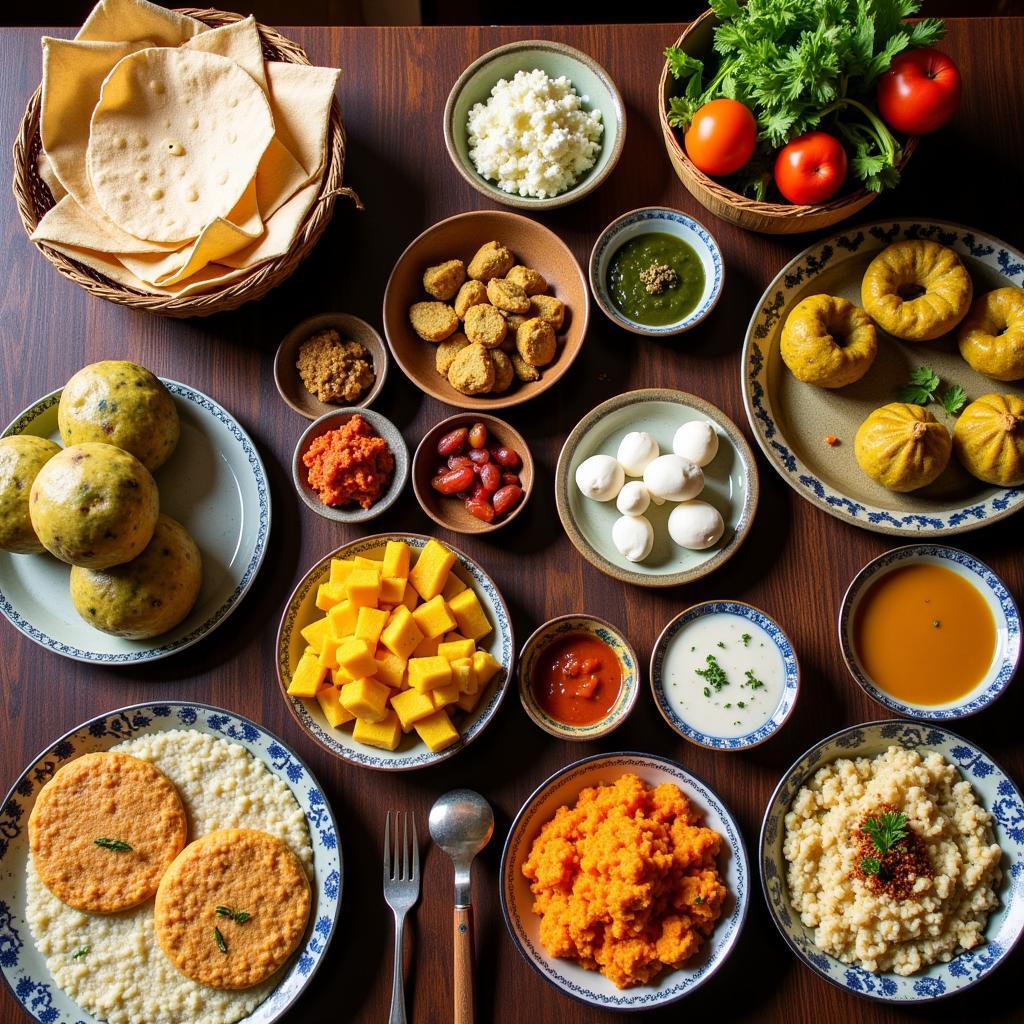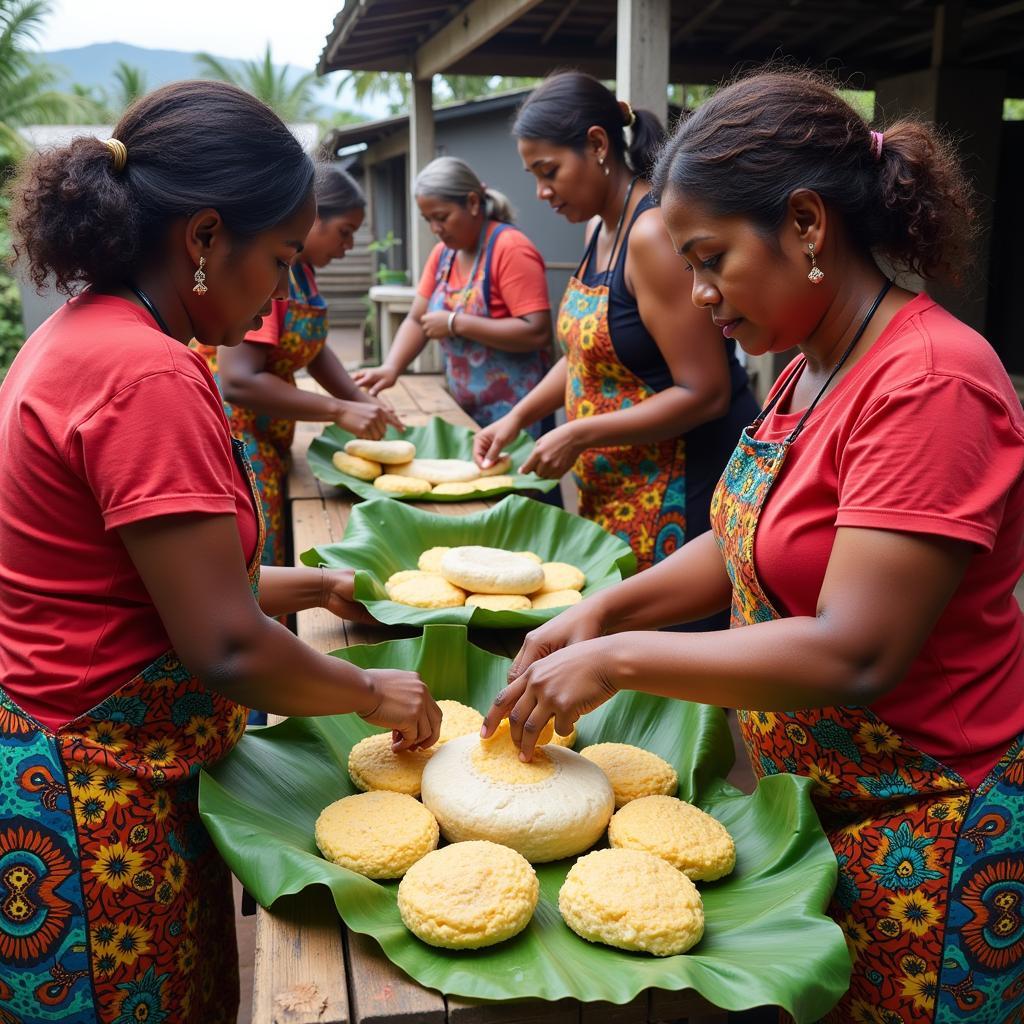A Journey into African Fermented Foods: Unveiling a World of Flavor and Tradition
From tangy injera to creamy kenkey, African Fermented Foods represent a vibrant tapestry of culinary heritage and nutritional wisdom. For centuries, communities across the continent have harnessed the power of fermentation to transform raw ingredients into flavorful, long-lasting staples. This ancient practice not only enhances taste and texture but also unlocks a wealth of health benefits, making African fermented foods a true testament to the ingenuity of African cuisine.
A Legacy of Flavor: Exploring the Diversity of African Fermented Foods
African fermented foods are as diverse as the continent itself, with each region boasting unique recipes and techniques passed down through generations. Let’s embark on a culinary journey to uncover some of these remarkable delicacies:
-
Injera (Ethiopia and Eritrea): This spongy, slightly sour flatbread, made from fermented teff flour, is a staple in Ethiopian and Eritrean cuisine. Injera serves as both plate and utensil, scooping up flavorful stews and lentils.
-
Kenkey (Ghana): This fermented corn dough dumpling, steamed in banana leaves, provides a delightful tangy flavor and chewy texture. Kenkey is enjoyed throughout Ghana, often paired with soups, stews, or grilled fish.
-
Gari (West Africa): A ubiquitous ingredient in West African cooking, gari is made from fermented cassava roots. This granular flour serves as the base for a variety of dishes, from porridge to doughs.
-
Melli (Chad): This unique fermented condiment, crafted from baobab tree seeds, adds a tangy and slightly nutty dimension to soups, stews, and sauces.
These examples represent only a glimpse into the vast repertoire of African fermented foods. From fermented dairy products like supu (Kenya) and amasi (South Africa) to fermented vegetables like makuwa (Zimbabwe) and ogiri (Nigeria), the culinary possibilities are boundless.
 A Colorful Spread of African Fermented Foods
A Colorful Spread of African Fermented Foods
The Science Behind the Magic: Understanding Fermentation
Fermentation, at its core, is a natural process where microorganisms like bacteria and yeast break down sugars in food, producing lactic acid, alcohol, or other byproducts. This transformation not only enhances flavor but also increases shelf life, improves digestibility, and boosts nutrient content.
-
Preserving Tradition: In many parts of Africa, fermentation plays a crucial role in food preservation, especially in areas with limited access to refrigeration. Lactic acid produced during fermentation acts as a natural preservative, extending the shelf life of perishable ingredients.
-
Unlocking Nutrition: Fermentation unlocks hidden nutritional treasures within food. For instance, it increases the bioavailability of certain vitamins and minerals, making them easier for our bodies to absorb. Additionally, fermentation can break down anti-nutrients, compounds that interfere with nutrient absorption.
-
Promoting Gut Health: Fermented foods are teeming with probiotics, beneficial bacteria that support a healthy gut microbiome. A balanced gut microbiome is essential for digestion, immunity, and overall well-being.
Embracing Heritage, One Bite at a Time
Beyond their nutritional and practical benefits, African fermented foods offer a powerful connection to cultural heritage and ancestral wisdom. These dishes tell stories of resourcefulness, innovation, and the deep-rooted relationship between food and community.
 Women Preparing Kenkey in Ghana
Women Preparing Kenkey in Ghana
Dr. Abena Agyeman, a Ghanaian food historian, notes, “African fermented foods are not merely sustenance; they are a tangible link to our past, a celebration of our ancestors’ ingenuity and a source of cultural pride.”
Exploring African Fermented Foods: Tips and Inspiration
Ready to embark on your own fermented food adventure? Here are a few tips:
- Start Small: Begin with readily available fermented foods like yogurt, sauerkraut, or kimchi to acclimate your palate.
- Seek Authenticity: Look for African grocery stores or restaurants specializing in traditional cuisine to experience authentic flavors.
- Experiment in the Kitchen: Try incorporating fermented ingredients like gari or injera into your recipes for a taste of Africa.
- Learn from Experts: Seek out recipes and guidance from African cooks and food bloggers to learn traditional techniques.
Unveiling a World of Flavor
African fermented foods offer a world of flavor waiting to be explored. From the tangy zest of injera to the creamy comfort of kenkey, these culinary treasures invite us to appreciate the artistry of fermentation and the rich tapestry of African cuisine. So, embark on a culinary journey, savor the unique flavors, and discover the cultural heritage woven into each delicious bite.
FAQs about African Fermented Foods
1. Are African fermented foods safe to eat?
Yes, African fermented foods are generally safe to eat. The fermentation process itself acts as a natural preservation method, inhibiting the growth of harmful bacteria. However, it’s essential to ensure you’re purchasing from reputable sources or following proper hygiene practices if preparing at home.
2. What are the health benefits of eating African fermented foods?
African fermented foods are rich in probiotics, beneficial bacteria that support gut health. They can also improve nutrient bioavailability, boost the immune system, and aid digestion.
3. Where can I find African fermented foods?
You can often find African fermented foods at African grocery stores, international markets, or restaurants specializing in African cuisine.
4. Can I make African fermented foods at home?
Absolutely! Many online resources and cookbooks provide recipes and guidance on fermenting foods at home.
Discover More About African Cuisine
Interested in delving deeper into the world of African food? Explore these related articles:
Need Help Exploring African Cuisine?
We are here to assist you on your culinary journey! Contact our team at:
- Phone: +255768904061
- Email: kaka.mag@gmail.com
- Address: Mbarali DC Mawindi, Kangaga, Tanzania
Our dedicated customer service team is available 24/7 to answer your questions and provide support.



